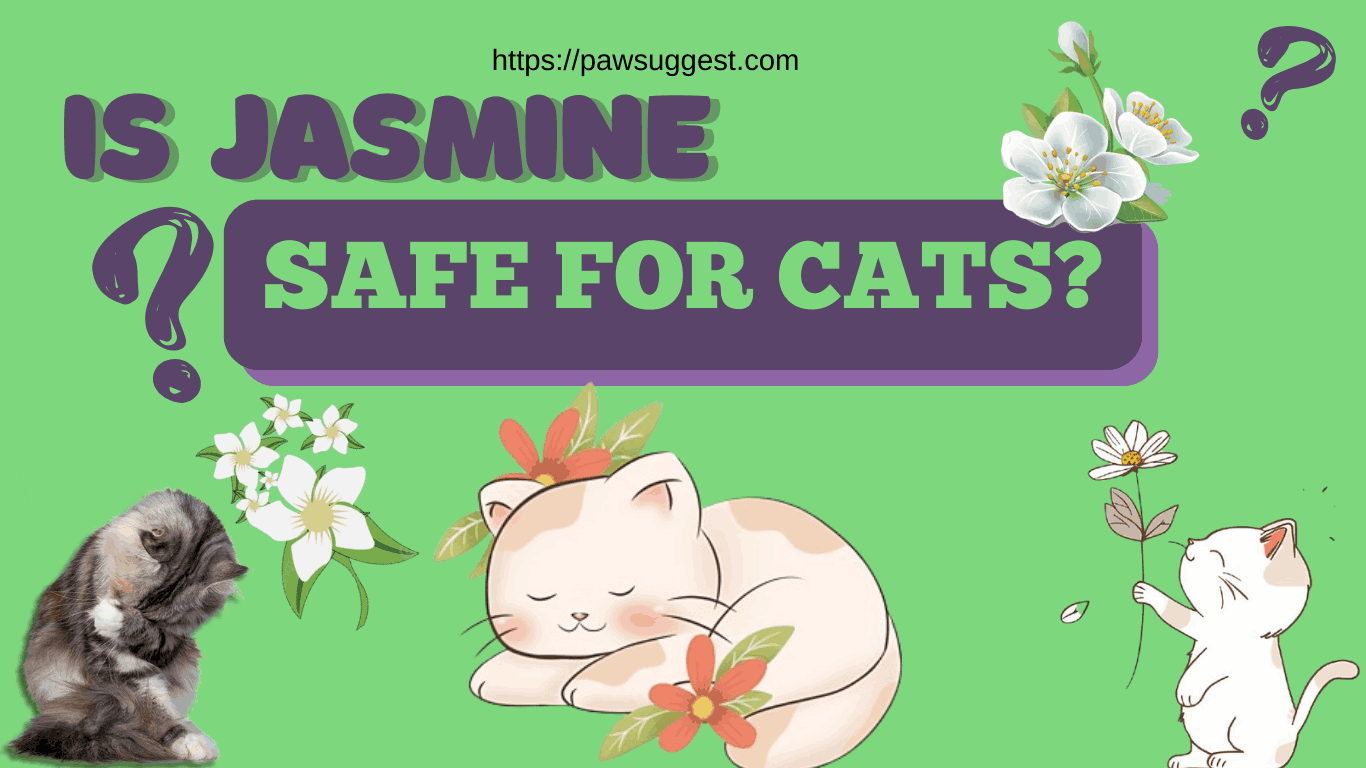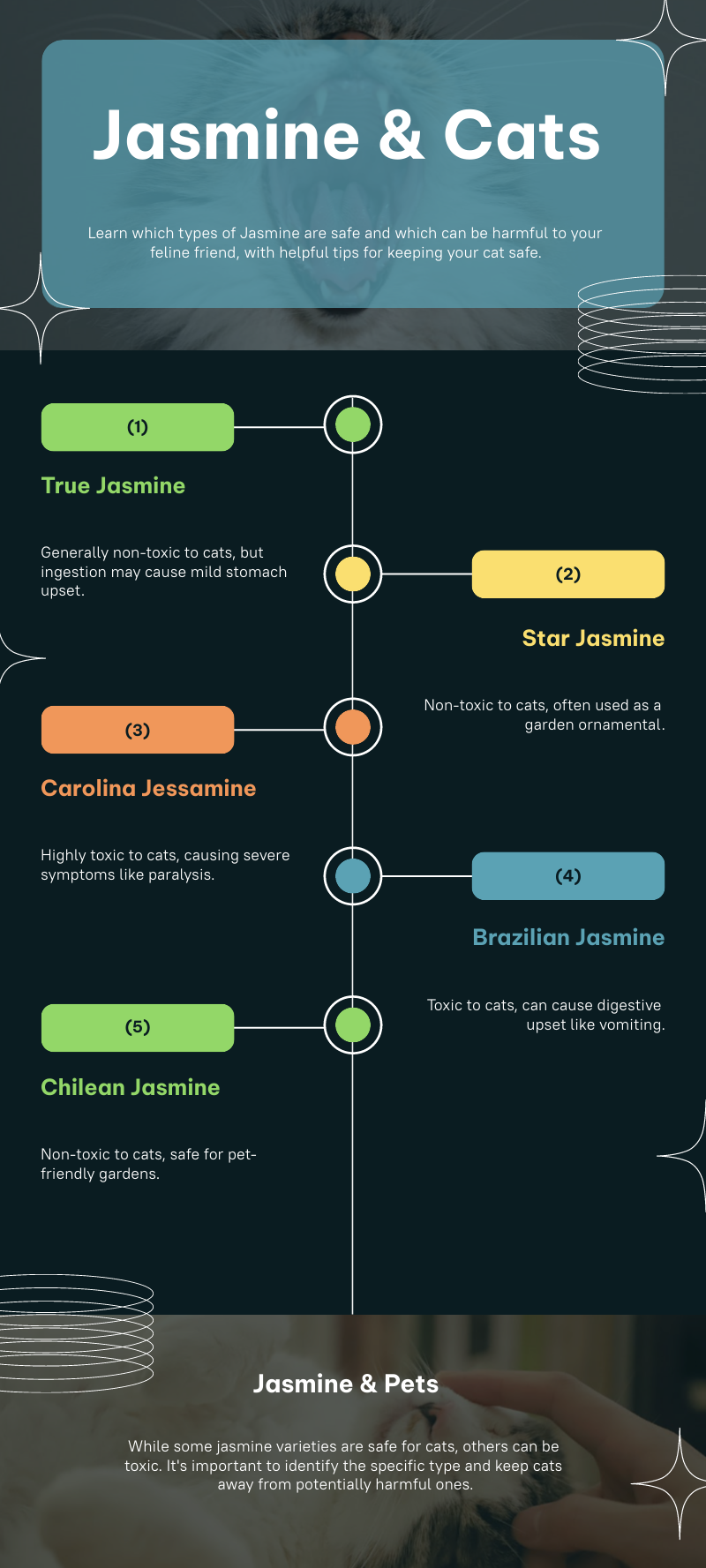Many of us enjoy gorgeous, colorful gardens and houseplants that add a special touch to our spaces. But if we own curious pets, some plants may pose an unexpected threat.
Jasmine is a favorite for its innocent beauty, fragrance, and symbol of love, but not all types are safe. True Jasmine isn’t generally toxic to cats, but knowing the difference between species is vital.
Cat owners should consider toxicity levels when choosing plants. According to the American Society for the Prevention of Cruelty to Animals (ASPCA), Jasminum Officinale is a common type recognized for low toxicity.
Yet, some varieties, like Star Jasmine, can still irritate with sap and may cause vomiting and diarrhea, so it’s best to prevent ingestion.

Is Jasmine Safe for Your Cat?
Only Short Answer:
- With almost 200 species, Jasmine covers a wide variety with unique properties. While its scent and elegance are admired, it’s imperative to understand potential toxicity risks.
- Keeping cats away from Jasmine is crucial to avoid gastrointestinal upset or worse. If ingestion occurs, seek vet care to keep our feline friends safe.
True Jasmine (Jasminum spp.) is generally safe for cats, causing only mild stomach upset if ingested. However, some varieties like Carolina Jessamine and Red Jasmine are highly toxic and can cause severe symptoms. Always identify the specific type of jasmine and prevent your cat’s access to potentially harmful species.
12 Types of Jasmine and Their Toxicity for Cats
Some types of jasmine are safe for cats, while others can be highly toxic, causing symptoms like vomiting, diarrhea, or worse. Understanding each variety’s effects helps protect your pet’s health:

I. True Jasmine (Jasminum spp.)
True Jasmine, from the Jasminum genus, includes over 12 species. According to the ASPCA, it’s generally non-toxic to pets. If a cat consumes true jasmine, it might only experience a mild stomach upset. Thankfully, this variety is usually safe, letting cat owners enjoy Jasmine’s delicate beauty without concern.
II. Star Jasmine (Trachelospermum jasminoides)
Star Jasmine, a spring-blooming plant, resembles true jasmine with star-shaped flowers and a sweet fragrance. Though native to China, it’s non-toxic to cats and often used as a garden ornamental. This variety’s gentle presence makes it a safe option for households with pets.
III. Carolina Jessamine (Gelsemium sempervirens)
Often mistaken for jasmine, Carolina Jessamine is not a true jasmine. It’s part of the Dogbane family and contains neurotoxins like gelsemine. If a cat consumes its leaves, flowers, or stems, it might experience severe symptoms like paralysis, respiratory distress, and even death. This plant is highly toxic and should be avoided around pets.
- Symptoms if ingested:
- Weakness and lethargy
- Drooling or difficulty swallowing
- Seizures, respiratory problems, and vision issues
IV. Brazilian Jasmine (Mandevilla spp.)
Brazilian Jasmine is a popular ornamental in warm climates, both indoors and outdoors. While beautiful, it’s toxic to cats and can lead to digestive upset if ingested. If your cat is gagging or shows signs of cat vomiting or diarrhea, Brazilian Jasmine could be the culprit.
V. Chilean Jasmine (Mandevilla laxa)
Chilean Jasmine, with white, tubular flowers, grows well in temperate regions. Unlike other types, it’s non-toxic to cats, making it a good choice for pet-safe gardens. Despite its exotic appeal, Chilean Jasmine won’t pose any risk to your feline friends.
VI. Madagascar Jasmine (Stephanotis floribunda)
Commonly called Madagascar Jasmine, this plant is safe for cats and a favorite for bouquets and wedding arrangements. Known for its pure white flowers, it’s a non-toxic option for pet-friendly households. You can enjoy its fragrance without worry.
VII. Night-Flowering Jasmine (Cestrum nocturnum)
Despite its romantic appeal and evening fragrance, Night-Flowering Jasmine is toxic to mammals. Its berries and flowers can cause weakness, lethargy, and confusion in cats if ingested. Pet owners should be cautious with this plant in the garden.
VIII. Cape Jasmine (Gardenia jasminoides)
Cape Jasmine isn’t a true Jasmine but does resemble one. It produces yellow fruits that contain toxic compounds such as geniposides. Ingesting it may cause diarrhea in cats as well as vomiting. Cape Jasmine is best avoided in gardens shared with pets.
IX. Crape Jasmine (Tabernaemontana divaricata)
Crape Jasmine, also called the pinwheel jasmine, is a common houseplant with delicate flowers and dark green foliage. It contains indole alkaloids, which can lead to heart issues and paralysis in cats if eaten. Increased drooling may be a warning sign if your cat has ingested this plant.
X. Arabian Jasmine (Jasminum sambac)
Native to Southeast Asia, Arabian Jasmine has a rich, fragrant scent and is non-toxic to cats. Its sweet-smelling blooms are generally harmless, allowing you to enjoy its beauty without putting your cat at risk.
XI. Yellow Jasmine (Gelsemium spp.)
Yellow Jasmine is highly toxic and should be kept away from cats. Known for its bright yellow flowers, it contains neurotoxins like gelsemine, which can cause muscle weakness, respiratory failure, and even death. Cats who consume any part of this plant may experience severe symptoms requiring immediate veterinary care.
XII. Red Jasmine (Plumeria rubra)
With its pinky-red blooms, Red Jasmine is attractive but dangerous. The plant contains alkaloids that can lead to salivation, vomiting, and diarrhea in cats. Avoid planting it in areas accessible to pets due to its strong toxicity.
Choosing non-toxic jasmine varieties for your garden can help avoid serious health risks for your cat. Always be mindful of plants that can cause reactions such as scabs on cat noses, digestive issues, or worse symptoms that may need urgent care.
6 Prevention Tips for Jasmine Toxicity in Cats
To keep your cat safe from toxic plants like jasmine, it’s crucial to be aware of simple, practical ways to minimize risk. Start by strategically placing any plants that might be harmful to cats out of reach.
-
Create Barriers and Elevate Plants
Place Jasmine on high shelves or hanging baskets where your cat’s acrobatic moves can’t easily reach them. Using small pots tucked onto shelves or ceiling hangers can be effective too. Fences or enclosed terrariums can help in setting physical barriers between the plant and your curious cat.
-
Use Deterrents for Extra Safety
Apply citrus spray, cayenne pepper, or strong scents around the jasmine plant to discourage your cat from approaching. Cats dislike the smell and taste, so these deterrents act as a natural barrier. Pinecones or aluminum foil around the base of the pot can also create a texture cats avoid.
-
Introduce Cat-Safe Alternatives
Provide cat-friendly plants like catnip or wheatgrass to satisfy their chewing needs. These safe options keep your cat engaged and distracted, reducing their interest in potentially harmful greenery. Offering a range of engaging items such as jingle balls and scratching posts is another way to satisfy their playful instincts.
-
Keep the Garden Cat-Safe
If you have a garden, consider crafting a cat-safe outdoor space by using fences or even prickly pebbles around your plants. Motion-activated sprinklers can also help deter cats from trespassing into garden areas that are risky for them.
-
Clean and Inspect Regularly
A clean litter box and regular patrols around the home and garden to check for signs of nibbling behavior can be helpful. Be on the lookout for any signs that your cat might have been near toxic plants.
-
Educate and Stay Vigilant
Ensure that other family members understand which plants, such as jasmine, can be unsafe for your cat. Always be vigilant and ready to take your pet to the vet immediately if you notice unusual activity like vomiting or drooling after potential plant exposure.
These steps allow both home and garden spaces to be safe for your cat without compromising your love for plants.
Immediate Response in Case of Jasmine Toxicity for Cats
If your feline friend has eaten Star Jasmine, stay calm to keep your cat controlled. Panicking might worsen the situation. Carefully remove any plant material from the cat’s mouth and try to keep them from eating or grooming any further.
First-Aid Measures
- Avoid inducing vomiting or giving home remedies without a vet’s guidance, as this can be risky.
- Collect a sample of the toxic jasmine and any vomit expelled. This will help your vet understand the species and any possible risk factors.
Veterinary Intervention
It’s crucial to consult a vet or call Pet Poison Helpline ASAP with all details of the incident, including any symptoms and the amount ingested. Bringing the sample along will aid in identification and treatment.
Supportive Care and Follow-Up
At the vet, supportive care may include IV fluids or activated charcoal to block toxin absorption. Follow advice for home care and monitor your kitty closely for any post-treatment symptoms.
Final Takeaway
It’s essential to know that while true jasmine is generally non-toxic to cats, other varieties can be harmful. Being mindful of plants in your home and garden is important, as some species are often mistakenly categorized as Jasmine. Limiting access to toxic plants helps avoid health risks.
- If a cat displays unusual behavior like vomiting after ingesting plants, seek prompt veterinary consultation.
- Choose non-toxic options for garden décor and provide plenty of distractions.
- By taking precautions, you can enjoy jasmine’s beauty while keeping your cat safe.
FAQs
Is the Jasmine plant harmful to cats?
Some jasmine varieties are safe for cats, but it’s vital to check first. Along with African violets and begonias, these eye-catching options can keep your feline friend safe and happy.
Is Jasmine pet-friendly?
White Jasmine, with its fragrant blossoms, is often adored by pet lovers. While Arabian Jasmine (Jasminum sambac) is mildly toxic, the truth is that White Jasmine (Jasminum officinale) is generally non-toxic, making it a pet-friendly option for dogs.
Is Jasmine safe for animals to eat?
Some species of Jasmine, like Jasmine officinale or Star Jasmine, are not toxic and are common in places like Australia. However, eating any plant material or grass might cause mild irritation to the mouth or lead to vomiting in animals.
Is Jasmine Rice safe for cats?
While rice isn’t toxic to cats, it isn’t very good for them either. Unlike dogs, which are considered omnivores and can get nutrition from many sources, cats are obligate carnivores and need most of their bulk nutrition from meat.

